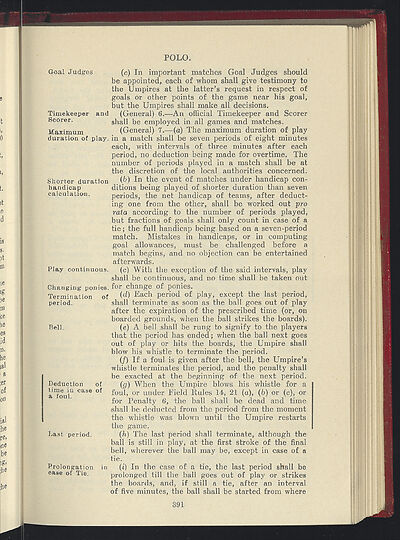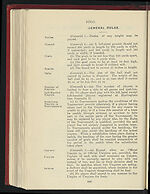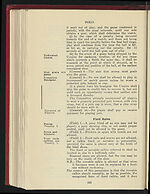1936-37
(413)
Download files
Complete book:
Individual page:
Thumbnail gallery: Grid view | List view

t
I,
0
t,
,
t.
A
,e
d
18
s.
of
m
le
ig
oe
m
ke
he
es
;
;d
V
,
be
'tal
a
,er
of
on
ial
,he
re,
me
be
1g,
:be
,he
Goal
Judges (c) In important matches Goal Judges should
be appointed, each of whom shall give testimony to
the Umpires at the latter's request in respect of
goals or other points of the game near his goal,
but the Umpires shall make all decisions.
Timekeeper and (General) 6.—An official Timekeeper and Scorer
Scorer. shall be employed in all games and matches.
Maximum (General) 7.—(a) The maximum duration of play
duration
of
play. in a match shall be seven periods of eight minutes
each, with intervals of three minutes after each
period, no deduction being made for overtime. The
number of periods played in a match shall be at
the discretion of the local authorities concerned.
Shorter duration (b) In the event of matches under handicap con-
handicap ditions being played of shorter duration than seven
calculation. periods, the net handicap of teams, after deduct-
ing one from the other, shall be worked out
pro
rata
according to the number of periods played,
but fractions of goals shall only count in case of a
tie; the full handicap being based on a seven-period
match. Mistakes in handicaps, or in computing
goal allowances, must be challenged before a
match begins, and no objection can be entertained
afterwards.
Play
continuous. (c) With the exception of the said intervals, play
shall be continuous, and no time shall be taken out
Changing ponies. for change of ponies.
Termination
of
(d) Each period of play, except the last period,
period. shall terminate as soon as the ball goes out of play
after the expiration of the prescribed time (or, on
boarded grounds, when the ball strikes the boards).
Bell.
(e) A bell shall be rung to signify to the players
that the period has ended; when the ball next goes
out of play or hits the boards, the Umpire shall
blow his whistle to terminate the period.
(f) If a foul is given after the bell, the Umpire's
whistle terminates the period, and the penalty shall
be exacted at the beginning of the next period.
Deduction
of
(g) When the Umpire blows his whistle for a
time in case
of
foul, or under Field Rules 14, 21 (a), (b) or (c), or
a foul.
for Penalty 6, the ball shall be dead and time
shall be deducted from the period from the moment
the whistle was blown until the Umpire restarts
the game.
Last period. (h) The last period shall terminate, although the
ball is still in play, at the first stroke of the final
bell, wherever the ball may be, except in case of a
tie.
Prolongation
in
(i) In the case of a tie, the last period shall be
case
of
Tie, prolonged till the ball goes out of play or strikes
the boards, and, if still a tie, after an interval
of five minutes, the ball shall be started from where
I,
0
t,
,
t.
A
,e
d
18
s.
of
m
le
ig
oe
m
ke
he
es
;
;d
V
,
be
'tal
a
,er
of
on
ial
,he
re,
me
be
1g,
:be
,he
Goal
Judges (c) In important matches Goal Judges should
be appointed, each of whom shall give testimony to
the Umpires at the latter's request in respect of
goals or other points of the game near his goal,
but the Umpires shall make all decisions.
Timekeeper and (General) 6.—An official Timekeeper and Scorer
Scorer. shall be employed in all games and matches.
Maximum (General) 7.—(a) The maximum duration of play
duration
of
play. in a match shall be seven periods of eight minutes
each, with intervals of three minutes after each
period, no deduction being made for overtime. The
number of periods played in a match shall be at
the discretion of the local authorities concerned.
Shorter duration (b) In the event of matches under handicap con-
handicap ditions being played of shorter duration than seven
calculation. periods, the net handicap of teams, after deduct-
ing one from the other, shall be worked out
pro
rata
according to the number of periods played,
but fractions of goals shall only count in case of a
tie; the full handicap being based on a seven-period
match. Mistakes in handicaps, or in computing
goal allowances, must be challenged before a
match begins, and no objection can be entertained
afterwards.
Play
continuous. (c) With the exception of the said intervals, play
shall be continuous, and no time shall be taken out
Changing ponies. for change of ponies.
Termination
of
(d) Each period of play, except the last period,
period. shall terminate as soon as the ball goes out of play
after the expiration of the prescribed time (or, on
boarded grounds, when the ball strikes the boards).
Bell.
(e) A bell shall be rung to signify to the players
that the period has ended; when the ball next goes
out of play or hits the boards, the Umpire shall
blow his whistle to terminate the period.
(f) If a foul is given after the bell, the Umpire's
whistle terminates the period, and the penalty shall
be exacted at the beginning of the next period.
Deduction
of
(g) When the Umpire blows his whistle for a
time in case
of
foul, or under Field Rules 14, 21 (a), (b) or (c), or
a foul.
for Penalty 6, the ball shall be dead and time
shall be deducted from the period from the moment
the whistle was blown until the Umpire restarts
the game.
Last period. (h) The last period shall terminate, although the
ball is still in play, at the first stroke of the final
bell, wherever the ball may be, except in case of a
tie.
Prolongation
in
(i) In the case of a tie, the last period shall be
case
of
Tie, prolonged till the ball goes out of play or strikes
the boards, and, if still a tie, after an interval
of five minutes, the ball shall be started from where
Set display mode to:
![]() Universal Viewer |
Universal Viewer | ![]() Mirador |
Large image | Transcription
Mirador |
Large image | Transcription
| Games and sports in the army > 1936-37 > (413) |
|---|
| Permanent URL | https://digital.nls.uk/248723307 |
|---|
| Description | 'Games and Sports in the Army' was an annual publication produced by the British War Office between the 1930s and 1960s. This included the Second World War. It outlines the rules and regulations for games and sports played by members of the armed forces. It features names and photographs of team members, and examples of contemporary advertising. |
|---|---|
| Shelfmark | GWB.52 |

